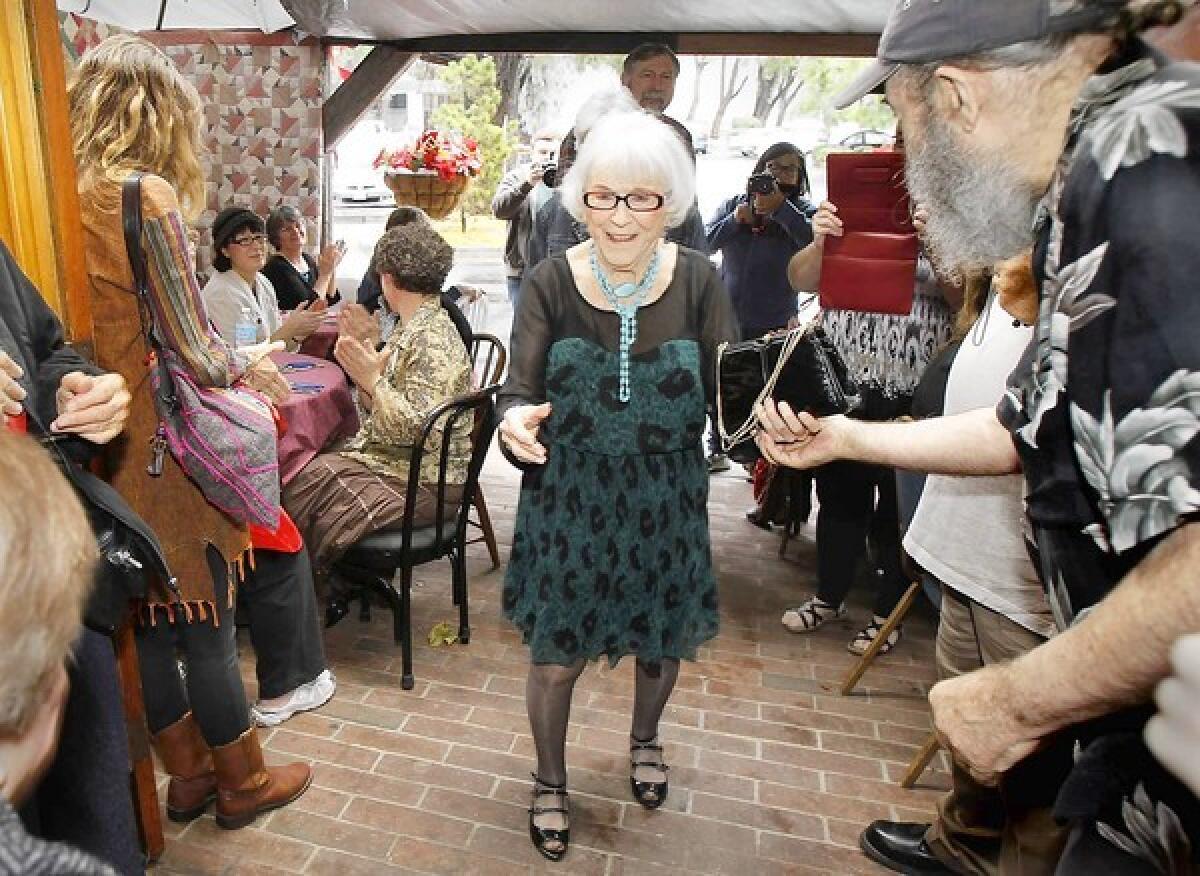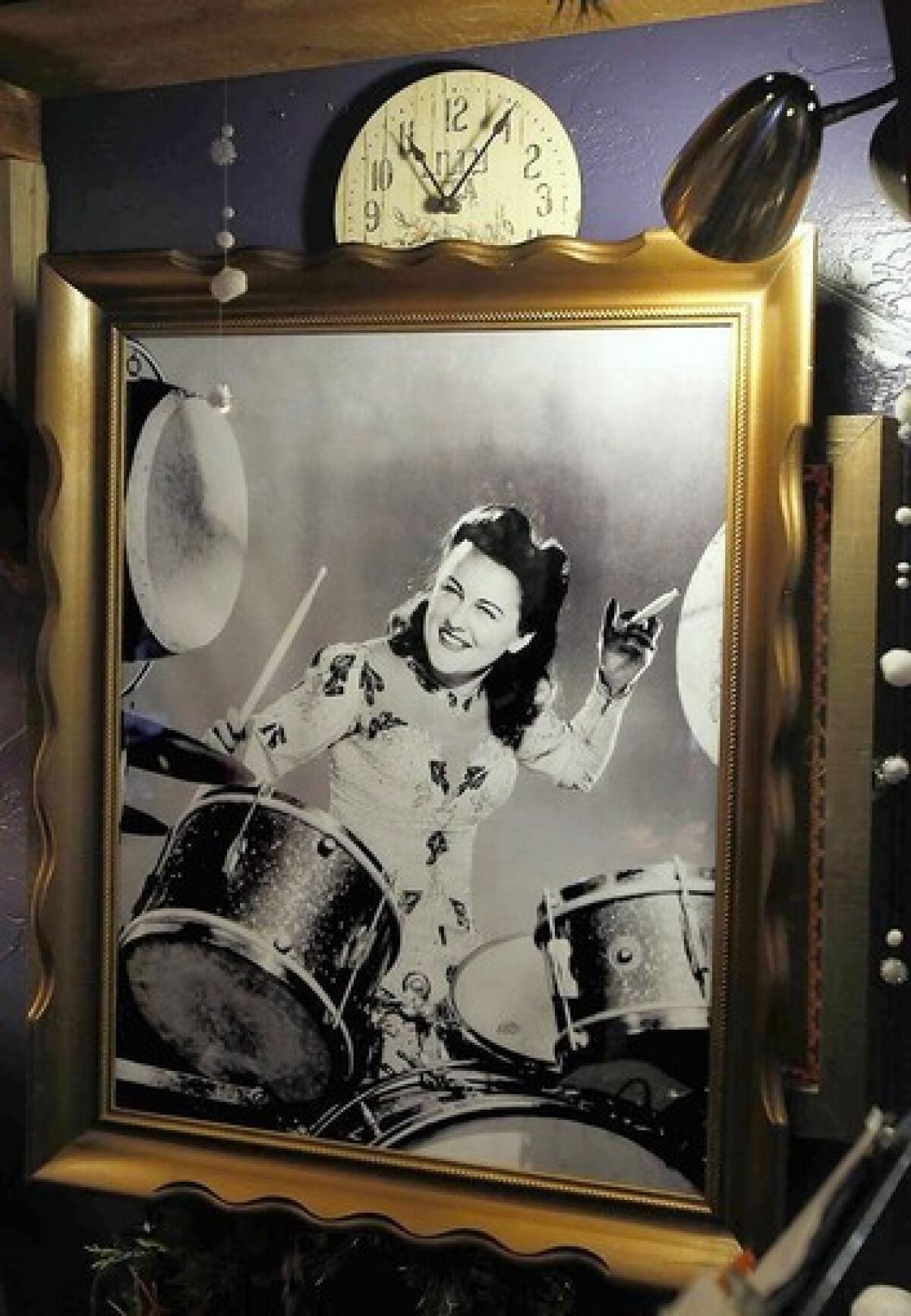Viola Smith, Costa Mesa resident and pioneering musician of the swing era, dies at 107

Viola Smith, a Costa Mesa resident and pioneering musician of the swing era who was billed in the 1930s as the “fastest girl drummer in the world,” has died. She was 107.
Smith died Wednesday at her home of complications from Alzheimer’s disease, her nephew, Dennis Bartash, told the Washington Post.
Smith kept time during an era when female musicians struggled to gain respect from their male colleagues. Despite that, in Smith’s decades-long professional career, she played alongside many of her famous contemporaries, including Ella Fitzgerald, Chick Webb and Bob Hope. She regularly performed and toured through the 1970s.
One of her many performing ensembles, the Coquettes, was an all-female orchestra in the 1930s and ‘40s. She famously turned down an offer to join clarinetist Woody Herman’s Thundering Herd to continue playing with an all-female group.
“Oh, those were the days,” Smith told the Daily Pilot in 2015, when the city of Costa Mesa honored her with a mayor’s proclamation. “After our shows, all the musicians on 52nd Street got together for dinner. It was so much fun. Sometimes I’d sit with Frank Sinatra in a booth. We’d meet all the musicians and singers.”
Her other appearances were with the NBC Symphony Orchestra and on “The Ed Sullivan Show” five times. She also became the face of the Zildjian cymbal company and Ludwig Drums.

In a Facebook post made Friday on its company page, Ludwig Drums applauded how Smith “paved the way for so many female drummers and was still playing at 107 years old! She was a true innovator and will be greatly missed.”
Angela Smith, author of “Women Drummers: A History from Rock and Jazz to Blues and Country,” made the introduction of her book about Viola Smith.
In a Facebook post Friday, Angela Smith noted how Viola Smith was legendary and possessed bravery “in speaking out for female musicians. [She] gave other women the courage and chops to break the barriers of what was once an all-too-male field.”
“She’s 100, and she’s got more [expletive] and vinegar than I ever had. But she was always like that.”
— Linda Bartash, Viola Smith’s niece
Angela Smith also wrote: “I recall how surprised and thrilled she was when she learned I was dedicating the book to her. I was told she held tightly to that book the last several days of her life and asked those around her to read from it, because she was so weak she couldn’t read for herself.”
Angela Smith said Viola Smith was sometimes referred to as the “female Gene Krupa,” another famous jazz drummer of the age known for his solo on Benny Goodman’s 1937 recording of “Sing, Sing, Sing.”
Viola Smith preferred flipping the title, however, saying Krupa was actually the “male Viola Smith.”
Smith was lauded for a groundbreaking editorial titled “Give Girl Musicians a Break,” which she published in 1942 for DownBeat, a trade magazine. At that time, many of the nation’s able-bodied male musicians were serving in the military to fight World War II, which left spots open for female performers.
Smith wrote, “In these times of national emergency, many of the star instrumentalists of the big-name bands are being drafted. Instead of replacing them with what may be mediocre talent, why not let some of the great girl musicians of the country take their place ... girls work right beside men in the factories, in the offices ... so why not in dance bands?”
Smith was born Viola Clara Schmitz on Nov. 29, 1912, in Mount Calvary, Wis. She grew up in a large musical family where piano training was mandatory.
Alongside her siblings, Smith played in an orchestra whose fame grew as the years went on. She recalled choosing the drums because all the other instruments were taken by her family members. But she was eager to learn.
Smith eventually moved to New York — her state of residence until 2011, when she moved to Costa Mesa to be closer to family.
“It’s always sad when someone passes away, but I don’t think Viola Smith would want us to shed any tears,” Costa Mesa Mayor Katrina Foley said. “At 107, she lived a long, vibrant and amazing life and began playing drums during World War II. What an inspiration for us all, especially young women. We send our condolences to her family and friends who will miss her dearly.”
Smith left no immediate survivors.
Even well into her 100s, she was known for her spunk.
“She’s 100, and she’s got more [expletive] and vinegar than I ever had,” Linda Bartash, Smith’s niece, told the Daily Pilot in 2012. “But she was always like that.”
All the latest on Orange County from Orange County.
Get our free TimesOC newsletter.
You may occasionally receive promotional content from the Daily Pilot.




